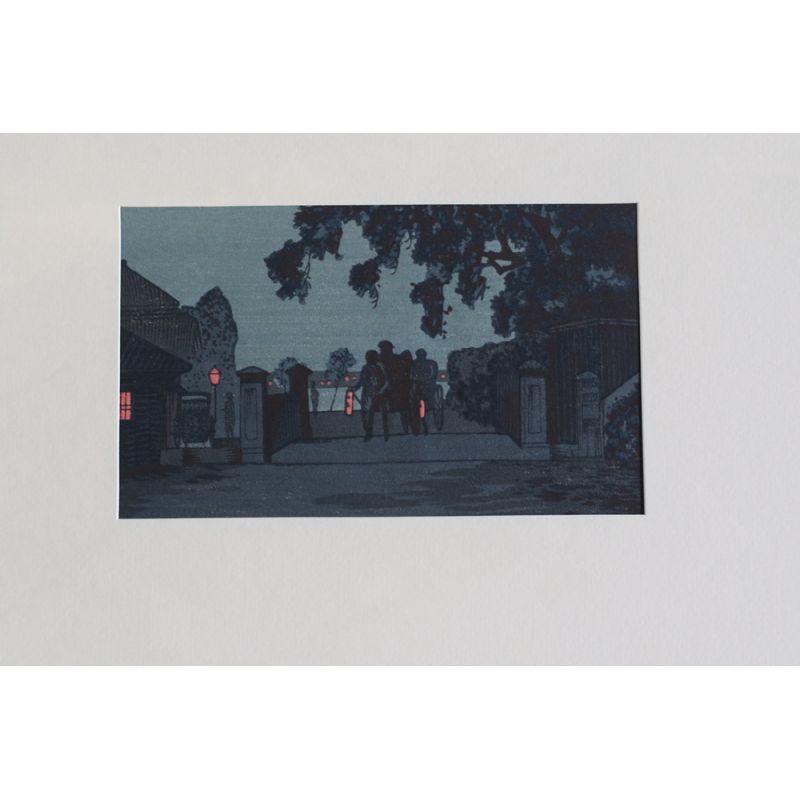





Print No. 109/130 – Koume Makura-bashi - True Pictures of Famous Places in Tokyo (reproduction: Showa Period 20th Century)
True Pictures of Famous Places in Tokyo
(From a series of over 130 works, each individually numbered)
Print No. 109/130 – Koume Makura-bashi
Yasuji Inoue (also known as Yasuharu, 1864–1889)
Unknown
Reproduction – Hand-printed Woodblock Print
Technique: Kōsen-ga (Light and Shadow Pictures)
Showa Period (20th Century)
Full Paper frame Size: 230 × 315 mm
Image (Window Cut) Size: 90 × 150 mm
No reproduction artist signature
Very good, no repairs or restoration
This print, titled "Koume Makura-bashi", portrays the area around Makura-bashi Bridge, situated at the confluence of the Kitajikkengawa and Sumida rivers in Tokyo. It is part of the iconic True Pictures of Famous Places in Tokyo series and exemplifies the Kōsen-ga technique—merging Western-style realism with traditional ukiyo-e composition.
Yasuji Inoue captures the subtle interaction between Meiji-era modernization and lingering Edo-period aesthetics. This print is held in the collections of respected institutions such as the Edo-Tokyo Museum and the Tokyo Metropolitan Library, attesting to its cultural significance.
This remarkable series captures scenes across Tokyo during the Meiji period, documenting the city's rapid modernization through the emotional lens of traditional woodblock artistry. Locations such as Asakusa, Ueno, Shinobazu Pond, Tsukiji, and Ginza are beautifully depicted. While each print functions as a standalone work of art, collectively the series forms a rich visual guidebook to Meiji-era Tokyo, offering historical and cultural insight into a transforming metropolis.
Yasuji Inoue was a gifted ukiyo-e artist known for his atmospheric and realistic portrayals of Meiji-period Tokyo. Born in Kawagoe, Saitama, he was the eldest son of a kimono merchant and was exposed to painting from an early age. At 15, he became a disciple of renowned artist Kiyochika Kobayashi and inherited his innovative style known as Kōsen-ga.
Despite dying young at age 26 due to beriberi, Yasuji created a significant body of work that captures the mood, architecture, and everyday life of his time. His prints are known for their subtle emotional tones, fine detail, and documentary value.
True Pictures of Famous Places in Tokyo (130+ scenes)
Night View of Cherry Blossoms at New Yoshiwara
Night View of Shops in Ginza
Kōsen-ga is a unique style of ukiyo-e that emerged in the Meiji era, heavily influenced by Western realism. It focuses on the play of light and shadow, introducing new depth and perspective to Japanese printmaking.
Realistic light and shadow: Skillful use of light based on time of day—morning, evening, and night scenes are all subtly different.
Western influence: Use of linear perspective and shadowing to create three-dimensional depth.
Everyday subject matter: Rather than only famous sites, many works depict common street scenes, bridges, and alleys.
Emotional restraint: Soft color palettes and delicate tonal balance evoke a quiet, reflective mood.